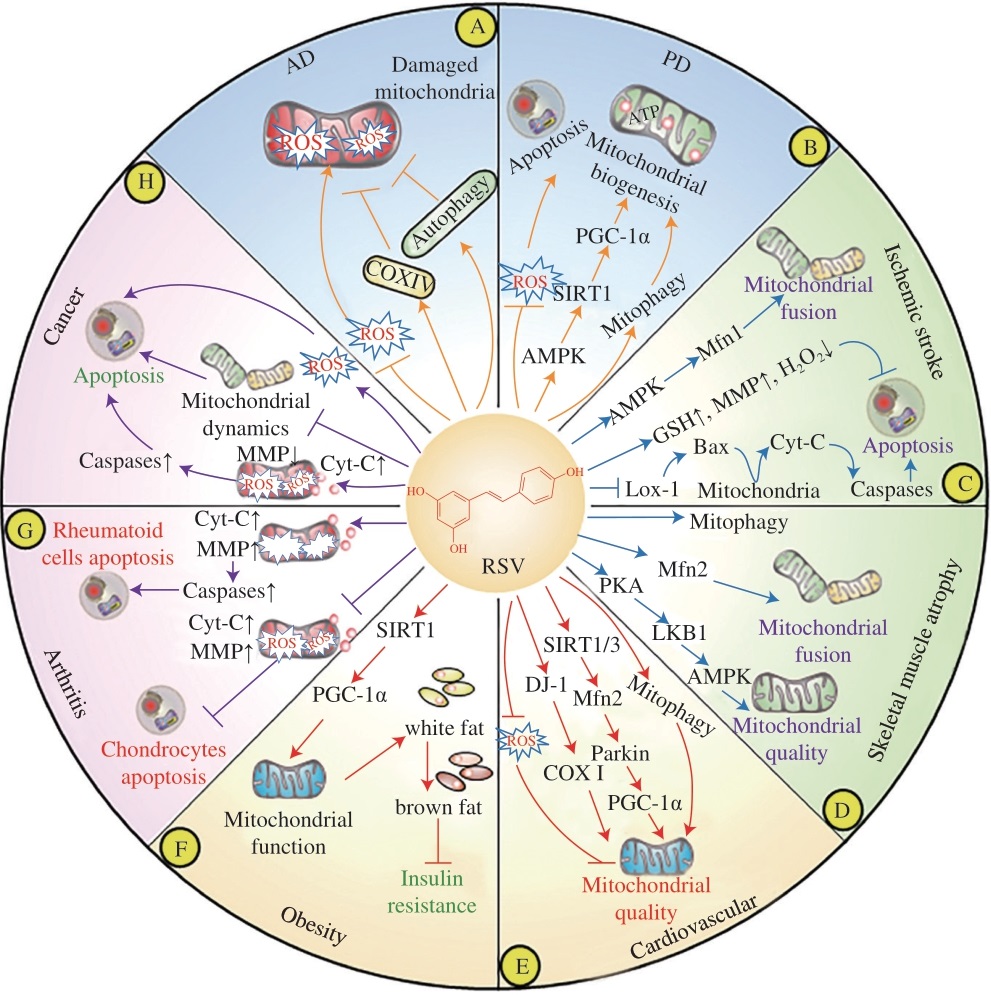According to a review published in Food Science and Human Wellness, resveratrol has a positive impact on mitochondrial dysfunction, one of the hallmarks of aging.

Resveratrol May Improve Mitochondrial Function
#1
Posted 29 October 2023 - 06:28 PM
The reviewers begin this paper by discussing various chronic and age-related diseases associated with mitochondrial dysfunction, including proteostasis-related diseases such as Alzheimer’s [1] and Parkinson’s [2], sarcopenia [3], cardiovascular disease [4], and even cancer [5] and obesity [6].
While there are drugs to alter mitochondrial function, these reviewers note a lack of therapies other than exercise that can affect fundamental mitochondrial maintenance processes, such as fusion, fission, and autophagy. In an effort to find such a therapy, these researchers have investigated the effects of resveratrol, a natural compound that has frequently been investigated as having potential use against the processes of aging.

Neurological diseases
Previous research has found that in Alzheimer’s disease, mitochondria supply less ATP to the neurons and exhibit signs of genetic damage [7]. However, one study has found that by using specially engineered nanoparticles, it is possible to direct resveratrol directly to the neurons, and this approach has had success in rodent models [8]. Orally administered resveratrol has also had success in enhancing signaling for removing damaged mitochondria (mitophagy) in Alzheimer’s disease models [9].
The compound has also had success in Parkinson’s disease models. In a rat model, resveratrol nanoparticles reduced Parkinson’s-like symptoms and ameliorates mitochondrial dysfunction [10]. Another study expanded upon the pathway involved, noting how resveratrol improved mitochondrial health and decreased cellular death in another model [11].
Cardiovascular diseases
This review also cites multiple papers reporting that resveratrol may be effective in treating both acute and chronic cardiovascular diseases. One paper suggests that resveratrol may help in recovery from ischemic stroke by reducing hydrogen peroxide [12]. Another paper has reported that resveratrol decreases the cellular death caused by oxidized low-density lipoprotein [13]. In another model of stroke, resveratrol was reported to protect both neurons and heart cells from death [14].
Many teams of researchers have reported that resveratrol may be effective in decreasing oxidative stress, thus keeping vascular tissue healthier for longer. One paper reported that resveratrol both increases the formation of mitochondria and decreases oxidative stress through the SIRT1 pathway [15]. The SIRT1 pathway is also involved in resveratrol’s potential protective effects against fat accumulation and obesity [16].
Age-related frailty disorders
Resveratrol may also be effective in the treatment of arthritis. According to one study, resveratrol’s positive effects on mitochondria lead to an reduction in damage to chondrocytes, the cells responsible for building cartilage [17]. Another study found that cells that encouraged arthritis symptoms had a lower survival rate when exposed to resveratrol [18].
The age-related muscle wasting known as sarcopenia has also been reported to be affected by resveratrol. Sirtuins are involved here as well, with their upregulation being accompanied by increased numbers of mitochondria, thus making more energy available for muscles [19]. However, in a human study, resveratrol supplementation needed to be combined with exercise to be effective against sarcopenia, suggesting a more complicated interaction [20].
Despite its various effects, however, resveratrol has never been proven to extend lifespan in people, and it does not appear to lengthen the lives of healthy mice. However, the data found in these studies remains valuable, and the basic mechanisms involved in resveratrol’s purported effects may be better targeted through resveratrol-containing nanoparticles or with other compounds or interventions that preserve mitochondrial function.
GIVE PER MONTH
Literature
[1] Sharma, C., Kim, S., Nam, Y., Jung, U. J., & Kim, S. R. (2021). Mitochondrial dysfunction as a driver of cognitive impairment in Alzheimer’s disease. International Journal of Molecular Sciences, 22(9), 4850.
[2] Bose, A., & Beal, M. F. (2016). Mitochondrial dysfunction in Parkinson’s disease. Journal of neurochemistry, 139, 216-231.
[3] Christian, C. J., & Benian, G. M. (2020). Animal models of sarcopenia. Aging Cell, 19(10), e13223.
[4] Stamerra, C. A., Di Giosia, P., Giorgini, P., Ferri, C., Sukhorukov, V. N., & Sahebkar, A. (2022). Mitochondrial dysfunction and cardiovascular disease: pathophysiology and emerging therapies. Oxidative Medicine and Cellular Longevity, 2022.
[5] Vasan, K., Werner, M., & Chandel, N. S. (2020). Mitochondrial metabolism as a target for cancer therapy. Cell metabolism, 32(3), 341-352.
[6] de Mello, A. H., Costa, A. B., Engel, J. D. G., & Rezin, G. T. (2018). Mitochondrial dysfunction in obesity. Life sciences, 192, 26-32.
[7] Perez Ortiz, J. M., & Swerdlow, R. H. (2019). Mitochondrial dysfunction in Alzheimer’s disease: Role in pathogenesis and novel therapeutic opportunities. British journal of pharmacology, 176(18), 3489-3507.
[8] Han, Y., Chu, X., Cui, L., Fu, S., Gao, C., Li, Y., & Sun, B. (2020). Neuronal mitochondria-targeted therapy for Alzheimer’s disease by systemic delivery of resveratrol using dual-modified novel biomimetic nanosystems. Drug Delivery, 27(1), 502-518.
[9] Wang, H., Jiang, T., Li, W., Gao, N. A., & Zhang, T. (2018). Resveratrol attenuates oxidative damage through activating mitophagy in an in vitro model of Alzheimer’s disease. Toxicology letters, 282, 100-108.
[10] Palle, S., & Neerati, P. (2018). Improved neuroprotective effect of resveratrol nanoparticles as evinced by abrogation of rotenone-induced behavioral deficits and oxidative and mitochondrial dysfunctions in rat model of Parkinson’s disease. Naunyn-Schmiedeberg’s Archives of Pharmacology, 391, 445-453.
[11] Zeng, W., Zhang, W., Lu, F., Gao, L., & Gao, G. (2017). Resveratrol attenuates MPP+-induced mitochondrial dysfunction and cell apoptosis via AKT/GSK-3ß pathway in SN4741 cells. Neuroscience letters, 637, 50-56.
[12] Yousuf, S., Atif, F., Ahmad, M., Hoda, N., Ishrat, T., Khan, B., & Islam, F. (2009). Resveratrol exerts its neuroprotective effect by modulating mitochondrial dysfunctions and associated cell death during cerebral ischemia. Brain research, 1250, 242-253.
[13] Chang, H. C., Chen, T. G., Tai, Y. T., Chen, T. L., Chiu, W. T., & Chen, R. M. (2011). Resveratrol attenuates oxidized LDL-evoked Lox-1 signaling and consequently protects against apoptotic insults to cerebrovascular endothelial cells. Journal of Cerebral Blood Flow & Metabolism, 31(3), 842-854.
[14] Wang, R., Liu, Y. Y., Liu, X. Y., Jia, S. W., Zhao, J., Cui, D., & Wang, L. (2014). Resveratrol protects neurons and the myocardium by reducing oxidative stress and ameliorating mitochondria damage in a cerebral ischemia rat model. Cellular Physiology and Biochemistry, 34(3), 854-864.
[15] Li, Y. G., Zhu, W., Tao, J. P., Xin, P., Liu, M. Y., Li, J. B., & Wei, M. (2013). Resveratrol protects cardiomyocytes from oxidative stress through SIRT1 and mitochondrial biogenesis signaling pathways. Biochemical and Biophysical Research Communications, 438(2), 270-276.
[16] Lagouge, M., Argmann, C., Gerhart-Hines, Z., Meziane, H., Lerin, C., Daussin, F., … & Auwerx, J. (2006). Resveratrol improves mitochondrial function and protects against metabolic disease by activating SIRT1 and PGC-1a. Cell, 127(6), 1109-1122.
[17] Dave, M., Attur, M., Palmer, G., Al-Mussawir, H. E., Kennish, L., Patel, J., & Abramson, S. B. (2008). The antioxidant resveratrol protects against chondrocyte apoptosis via effects on mitochondrial polarization and ATP production. Arthritis & Rheumatism, 58(9), 2786-2797.
[18] Nakayama, H., Yaguchi, T., Yoshiya, S., & Nishizaki, T. (2012). Resveratrol induces apoptosis MH7A human rheumatoid arthritis synovial cells in a sirtuin 1-dependent manner. Rheumatology international, 32, 151-157.
[19 Higashida, K., Kim, S. H., Jung, S. R., Asaka, M., Holloszy, J. O., & Han, D. H. (2013). Effects of resveratrol and SIRT1 on PGC-1a activity and mitochondrial biogenesis: a reevaluation. PLoS biology, 11(7), e1001603.
[20] Polley, K. R., Jenkins, N., O’Connor, P., & McCully, K. (2016). Influence of exercise training with resveratrol supplementation on skeletal muscle mitochondrial capacity. Applied physiology, nutrition, and metabolism, 41(1), 26-32.
View the article at lifespan.io








































